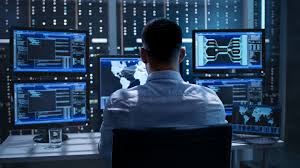In today’s fast-paced world, security is a top priority for individuals, businesses, and organizations alike. One of the most effective tools in ensuring security and surveillance is the Closed Circuit Television (CCTV) network.
A CCTV network consists of a series of cameras strategically placed in various locations to monitor and record activities in real-time. These cameras are connected to a central monitoring system where live footage can be viewed and recorded for future reference.
The benefits of a CCTV network are numerous. Firstly, it acts as a deterrent to potential criminals, as the presence of cameras can discourage unlawful activities. Secondly, in the event of an incident, CCTV footage serves as valuable evidence that can aid in investigations and help identify perpetrators.
Moreover, a CCTV network provides round-the-clock surveillance, allowing for continuous monitoring of sensitive areas such as entry points, parking lots, and high-security zones. This constant vigilance helps enhance overall security measures and ensures prompt response to any suspicious activity.
With advancements in technology, modern CCTV networks offer features such as motion detection, night vision capabilities, remote access via smartphones or computers, and high-definition video quality. These features make CCTV networks more efficient and reliable in providing comprehensive security solutions.
In conclusion, a well-designed CCTV network is an indispensable tool for maintaining security and peace of mind in today’s unpredictable world. Whether used for home security, business premises monitoring, or public space surveillance, investing in a CCTV network is a proactive step towards safeguarding assets and ensuring safety for all.
9 Essential Tips for Optimizing and Securing Your CCTV Network
- Place cameras strategically to cover key areas
- Ensure proper lighting for clear footage
- Regularly check and maintain cameras for optimal performance
- Use high-resolution cameras for better image quality
- Secure the DVR/NVR to prevent unauthorized access
- Implement password protection and encryption for security
- Backup footage regularly to prevent data loss
- Train staff on CCTV operation and monitoring procedures
- Comply with privacy laws when installing CCTV cameras
Place cameras strategically to cover key areas
Strategic placement of cameras is crucial in maximizing the effectiveness of a CCTV network. By identifying and covering key areas such as entry points, high-traffic zones, and valuable assets, you can ensure comprehensive surveillance coverage. Placing cameras strategically not only deters potential intruders but also provides clear and detailed footage for monitoring and investigation purposes. Remember, the success of a CCTV network lies in its ability to capture critical moments, so thoughtful positioning of cameras is essential for optimal security coverage.
Ensure proper lighting for clear footage
One crucial tip for maximizing the effectiveness of a CCTV network is to ensure proper lighting for clear footage. Adequate lighting plays a significant role in capturing high-quality images and videos, allowing cameras to record detailed information even in low-light conditions. By installing additional lighting sources or adjusting existing lighting fixtures strategically, the clarity and visibility of surveillance footage can be greatly enhanced. This simple yet essential step can make a significant difference in the overall performance and reliability of a CCTV network, ensuring that critical details are captured accurately for effective monitoring and security purposes.
Regularly check and maintain cameras for optimal performance
Regularly checking and maintaining cameras in a CCTV network is crucial for ensuring optimal performance and reliability. By conducting routine inspections, cleaning lenses, adjusting angles, and testing functionalities, potential issues can be identified and addressed promptly. This proactive approach not only helps in preventing camera malfunctions but also ensures that the surveillance system operates effectively at all times. Regular maintenance of CCTV cameras enhances overall security measures and provides peace of mind knowing that the system is functioning efficiently to capture clear and accurate footage when needed.
Use high-resolution cameras for better image quality
When setting up a CCTV network, it is crucial to use high-resolution cameras to ensure better image quality and clarity of footage. High-resolution cameras capture finer details and provide sharper images, making it easier to identify individuals, objects, or events in the recorded video. By investing in high-resolution cameras, you enhance the overall effectiveness of your surveillance system, enabling better monitoring and accurate documentation of activities within the monitored area. This tip not only improves security but also adds a layer of reliability to your CCTV network, offering enhanced peace of mind knowing that critical details are captured with precision.
Secure the DVR/NVR to prevent unauthorized access
Securing the DVR/NVR is a crucial step in maintaining the integrity and effectiveness of a CCTV network. By preventing unauthorized access to the recording device, sensitive footage and data remain protected from potential breaches or tampering. Implementing strong passwords, enabling two-factor authentication, and regularly updating firmware are recommended measures to enhance the security of the DVR/NVR. By prioritizing the safeguarding of this key component, users can ensure that their CCTV network operates smoothly and securely, providing reliable surveillance for peace of mind.
Implement password protection and encryption for security
Implementing password protection and encryption for a CCTV network is crucial for enhancing security measures and safeguarding sensitive information. By setting up strong passwords and enabling encryption protocols, unauthorized access to the network can be significantly reduced, ensuring that only authorized personnel can view and manage the surveillance footage. Password protection adds an additional layer of defense against cyber threats and potential breaches, while encryption helps secure data transmission between cameras, recording devices, and monitoring stations. Together, these security measures play a vital role in maintaining the integrity and confidentiality of the CCTV network, providing peace of mind to users regarding the safety of their surveillance system.
Backup footage regularly to prevent data loss
Regularly backing up CCTV footage is a crucial practice to prevent data loss and ensure the availability of critical video recordings when needed. By establishing a routine backup schedule, businesses and individuals can safeguard against potential hardware failures, theft, or accidental deletion of footage. This proactive approach not only protects valuable information but also maintains the integrity of surveillance data for future reference and investigations. Implementing a reliable backup system for CCTV footage is an essential component of a robust security strategy that prioritizes data preservation and accessibility.
Train staff on CCTV operation and monitoring procedures
Training staff on CCTV operation and monitoring procedures is crucial for maximizing the effectiveness of a CCTV network. By providing comprehensive training, employees can learn how to operate the system efficiently, understand the monitoring procedures, and respond effectively to security incidents. This training ensures that staff members are equipped with the necessary skills to utilize the CCTV network to its full potential, enhancing overall security measures and enabling a swift and coordinated response in critical situations.
Comply with privacy laws when installing CCTV cameras
It is crucial to comply with privacy laws when installing CCTV cameras to ensure the protection of individuals’ rights and privacy. Adhering to legal regulations regarding the placement, monitoring, and recording of CCTV footage helps prevent unauthorized surveillance and misuse of personal information. By following privacy laws, such as obtaining consent from individuals before recording in private areas and securely storing recorded footage, businesses and individuals can maintain ethical practices while enhancing security measures through their CCTV network.



